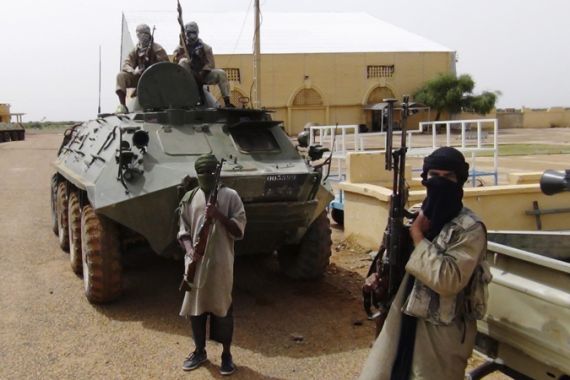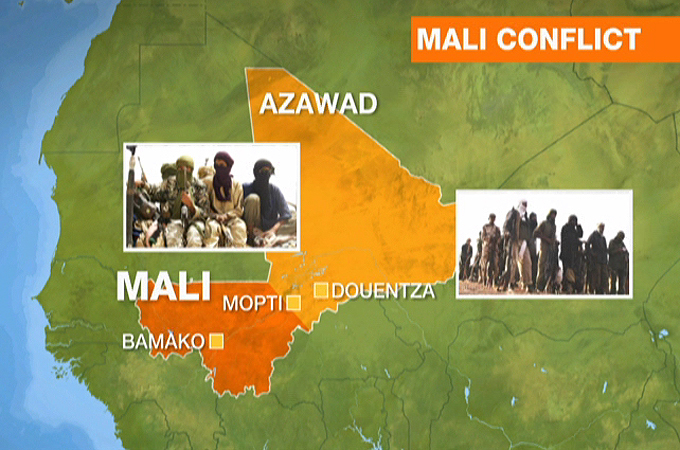Algeria baffled by reported diplomat murder
Unconfirmed execution of diplomat in Mali has potential implications for Algeria’s anti-intervention stance in region.

The reported execution of an Algerian diplomat by one of the separatist groups that has taken over parts of northern Mali has left Algiers baffled, according to reports in Algerian media.
The unconfirmed killing has also stirred debate on whether Algeria might be forced to abandon its opposition to a regional intervention force in its southern neighbour.
Taher Touati, Algeria’s vice-consul, was one of a group of seven Algerian diplomats kidnapped from the Algerian consulate in the town of Gao by the Movement for Oneness and Jihad in West Africa (MUJAO) on April 5.
Along with Liberation of Azawad (MNLA) and Ansar Dine, MUJAO is one of the armed groups that has taken control of northern Mali since March 2012.
While MUJAO has been amongst the groups imposing a strict interpretation of Islamic law on the parts of northen Mali in its control – reportedly including stonings and amputations – analysts agree the ragtag group has in the past been more focused on profiteering from criminal activity than advocating any particular ideology.
In recent years they have been involved in trafficking drugs from Guinea Bissau to Mali, via Mauritania, and in the abductions of foreigners, Alessandra Giuffrida, an anthropologist at the School of Oriental and African Studies in London, told Al Jazeera.
Unlike the MNLA, neither Ansar Dine nor the MUJAO have any links to the Tuareg independence movement.
Three of the hostages were released following negotiations in July. With three surviving Algerian hostages still in the group’s hands of the group, Algerian media on Monday questioned whether the government might do better to agree to the prisoner swap.
“Opposed to any form of ransom payment or to the release of imprisoned terrorists, will the Algerian authorities reconsider their position?” the Algerian daily newspaper El Watan wrote in an editorial.
“Pushed by Western powers to participate in a possible military intervention in the Sahel, Algiers refuses to be involved in any military intervention on foreign soil, even though religious extremists control a good part of northern Mali.”
‘No evidence to confirm execution’
Touati’s execution was reported on Sunday afternoon by the Agence Nouakchott d’information (ANI), a Mauritanian website, which quoted a statement reportedly from al-Qaeda in the Islamic Maghreb (AQIM):
“The Algerian government must take complete responsibility for the consequences of its stubbornness and the misguided and irresponsible decisions of its president and its generals.”
 |
AQIM was originally an Algerian-based movement that migrated south in the Sahel region that has been implicated in many kidnappings in recent years.
“The diplomat was executed. It was to teach the Algerians a lesson,” Omar Ould Hamaha, a spokesperson for MUJAO, was quoted as saying by the Associated Press news agency’s Bamako correspondent.
Most Algerian media hesitated to report the news until Sunday evening. Their caution was born out of experience with hundreds of similar cases – during Algeria’s civil war of the 1990s, statements purportedly from one extremist group or another often turned out to be fabrications or manipulations, even at the national level.
The Algerian foreign affairs ministry had said in a statement that it had no information to confirm the execution and that it was trying to confirm the reports.
“The statement announcing the execution of the Algerian vice-consular official can only fuel surprise and justify the steps taken to try to confirm the accuracy of the information sent out on late Saturday,” the ministry said.
The families of the hostages were informed by the foreign ministry that it was still in contact with the kidnappers, El Watan reported.
As of Monday evening, the ministry said there was still no evidence to confirm the execution.
Controversial intervention
Until early 2012, Mali was one of the region’s most stable democracies. Since Mali’s government was overthrown in a military coup on March 22, and the Malian military lost control of the north, there have been growing calls for foreign intervention.
The Economic Community of West African States (ECOWAS) has been pushing to send a force of 3,000 soldiers to Mali, but is awaiting UN approval. Niger and Nigeria are the biggest advocates of intervention, with support from France and the US.
Algeria and Mauritania have strongly opposed the idea, and has called for negotiations instead.
When France’s foreign minister Laurent Fabius visited Algiers in July, his Algerian counterpart Mourad Medelci told him firmly that “the solution in Mali lies in the hands of Malians,” according to Radio France International.
|
Al Jazeera’s Hashem Ahelbarra reports on the latest in Mali. |
Mali’s interim government and army have also sought to affirm its sovereignty.
On August 15, Colonel Ibrahima Dahirou Dembele, the chief of staff of Mali’s army, said they would allow for a much smaller force than ECOWAS is advocating:
“There is no question of soldiers from [West Africa’s] ECOWAS bloc in Bamako but [they could send] some to the North,” he said. “We could have 600-800 ECOWAS troops in support of ours.”
Many Algerian analysts fear that the chaos in Mali will be an excuse for Western powers to turn their thirst for resources, so long focused on the Middle East, to the Sahel region, under the guise of security concerns.
Laurence Aida Ammour, a specialist in international geopolitics in the Sahel region, was quoted by El Watan on Monday as describing the possible ECOWAS intervention as part of a wider resource battle.
The US government’s regional aspirations are centred on “the securisation of a supply of hydrocarbons from north Africa and the Gulf of Guinea, and to insure that the Sahara region does not become a grey zone, a permanent sanctuary to Islamic terrorism and organised crime”, she said.
And given Algeria’s vulnerable domestic situation, the regime is not well-positioned to assert its regional influence.
The National Liberation Front has been ruling since the country’s independence in 1962. In a country where the average age is 28 years old, according to the CIA World Factbook, the generation that came of age during the War of Independence has clung on to power for decades.
Under pressure from the tide of uprisings in neighbouring countries in 2011, the government promised that the country’s May 2012 parliamentary elections would be the freest and fairest in the country’s history.
Many opposition parties, however, either boycotted the polls or were not allowed to participate. And most commentators were skeptical of the official poll turnout of 42.9 per cent, hailed by the authorities as proof that the public still had faith in their political system.
The kidnappings have only served to underline the regime’s fragility, and just how vulnerable that leaves the whole Sahel region.